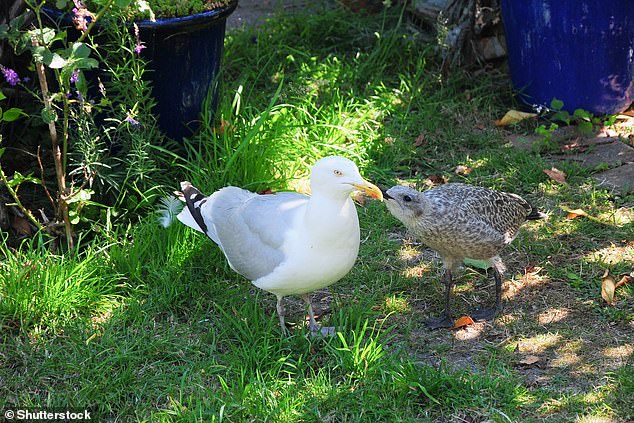We’ve got a problem with seagulls in our garden.
A pair of seagulls had some chicks and the entire family has made themselves at home in our garden.
I get dive-bombed every time I try to go in the garden. Even when we have days of lovely sunshine, I can’t let my son play outside as the seagulls won’t stop flying near his head. He came running back inside screaming when he encountered them once! I can’t let the dog in the garden either.
There’s also the noise issue. My son usually sleeps from 7pm to 7am, but has been repeatedly woken up at 4am by the seagulls.
We’re all fed up. How can we get the seagulls to move on without causing them harm?

Neighbour woes: A This is Money reader is having a spot of bother with seagulls in her garden
Jane Denton, of This is Money, replies: There are about 50 different species of gulls around the world, with six commonly breeding in Britain.
In Britain you’re likely to see, among others, herring gulls and lesser black-backed gulls.
As their conventional food sources decline, gulls have adapted and now often find food from other sources.
Gulls are devoted parents. When gulls become parents, dive-bombing can be a problem. This is a defence mechanism used by the gulls when they feel threatened or in danger.
All species of gull are protected under the Wildlife and Countryside Act 1981 and the Wildlife (Northern Ireland) Order 1985.
However, the law recognises that in certain circumstances control measures may be necessary.
I’ve spoken to two wildlife expert for their thoughts on the problems you are facing.
Emma Rosenfeld, a manager at the Environmental Records Centre for Cornwall and the Isles of Scilly, working in conjunction with the Cornwall Wildlife Trust, says: We understand how distressing it can be when gulls impact the use of your garden, especially with young children and pets to consider.
While it may feel like an attack, it’s actually defensive behaviour. A chick may have fallen from a rooftop nest into your garden, and the adult gulls are simply doing what any parent would: protecting their young.

Emma Rosenfeld of the ERCISS
Gulls may swoop to deter perceived threats but rarely make contact, and if they do it’s typically with their feet not beaks.
They usually only act when people are near their nests or chicks, so if you move away they should settle and return to caring for their young.
Two main gull species now nest in urban areas, due to declining natural habitats, readily available food and rooftops offering safe nesting spaces.
Herring gulls, likely the kind you’re encountering, are now red-listed as birds of conservation concern. Their population fell by 72 per cent between 1969 and 2014.
Gulls, like all wild birds in Britain, are protected by law under the Wildlife and Countryside Act 1981. It is illegal to disturb nests or remove them without a licence.
The best approach is patience. Once chicks fledge, the family will move on. In the meantime, wearing a hat or using an umbrella or long stick to deter swooping may look odd, but it works.
Gulls are no threat to pet dogs, though they may be frightened by them. It would be kind to not let a dog go close to a breeding gull.
Nature is in crisis, and urban wildlife is adapting to survive. These gulls are not aggressive, just scared and protecting their young.
By remaining calm, considerate and avoiding feeding them, we can coexist peacefully with the remarkable wildlife now sharing our towns and cities.
If you are concerned about a gull’s health, please do call a wildlife rescue centre rather than a wildlife trust.
Dr Rebecca Machin, RSPCA scientific officer, says: Gulls are intelligent animals who form strong social bonds with each other, and deserve to be treated with respect.
Some gulls are declining in numbers, so it’s important to ensure we protect them.
Sadly, some people have an unfavourable opinion of gulls because of their behaviour, particularly at certain times of the year.
While this is understandable, there are natural reasons for what the birds do and these can be managed with a little care and understanding.

Dr Rebecca Machin of the RSPCA
Gulls that swoop suddenly on people or pets are usually trying to protect their nests, or chicks who have fallen from – or left – the nest.
They’ll stop when the person or animal has moved away from their young. This behaviour usually only lasts for a few weeks until the chicks have fledged and are able to protect themselves.
If it becomes a problem, try to avoid routes which pass near nesting gulls, and if you’re worried about being pecked, a hat or umbrella can work wonders!
Gulls make the most noise between May and July when they’re breeding so it’s best to leave them alone during this time until the season is over.
If you wish to take preventative action so they don’t return, do this later in the year. Gulls are also less likely to settle near people where litter and food waste is responsibly recycled or disposed of.
The best way to stop gulls nesting on a roof is by fitting a humane deterrent in the winter to limit opportunities for them to settle there during the breeding season.
However, it is important that whatever method is used, it is installed properly by trained professionals and inspected regularly.
Anti-perch methods, such as spikes, are considered to be one of the most humane ways of trying to minimise problems.
The spikes are usually angled so it makes it awkward for them to land on, but won’t impale the bird; some will be designed to bend but be firm enough to provide an uncomfortable perching or roosting place.
Netting can also be a humane and long term solution to deterring gulls from nesting.
Using the correct mesh size and tension will help reduce the possibility of a bird getting caught in the netting. It’s essential that netting is well maintained and managed to ensure gulls and other birds don’t become trapped.
In addition, a simple wire-framed structure can be placed around chimney pots. This will stop birds from settling and ensure they can’t fold their wings when they land.
It’s also a good idea to clear all the moss and plants off the roof and out of gutters, so birds cannot use this as nesting material.
As with all wild birds, gulls and their nests are protected by law. This means it’s illegal to intentionally kill, take or injure gulls, take or destroy their eggs, or damage or destroy any gull nests while they’re in use or being built – unless you’re acting under licence.












